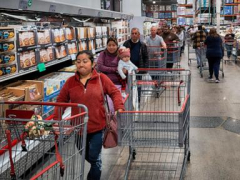WASHINGTON — U.S. consumers cut back sharply on spending last month, the most since February 2021, even as inflation declined, though stiff tariffs threatened by the White House could disrupt that progress.
Americans cut their spending by 0.2% in January from the previous month, the Commerce Department said Friday, likely in part because of unseasonably cold weather. Yet the retreat may be hinting at more caution by consumers amid rising economic uncertainty.
Inflation declined to 2.5% in January compared with a year earlier, down from 2.6% in December, the government said. Excluding the volatile food and energy categories, core prices dropped to 2.6%, the lowest since June, from 2.9%.
One other bright spot in the report was that incomes jumped 0.9% in January from December, fueled in part by a large annual cost of living adjustment for Social Security beneficiaries.
Inflation spiked in 2022 to its highest level in four decades, propelling President Donald Trump to the White House and causing the Federal Reserve to rapidly raise interest rates to tame prices. It has since fallen from a peak of 7.2%.
Last month’s decline could reassure Fed officials that inflation is still slowly cooling. The Fed prefers Friday’s measure to the more widely-known consumer price index, which rose for the fourth straight month in January to 3%. Friday’s gauge calculates inflation slightly differently: For example, it puts less weight on the costs of housing and used cars.
Even so, the key question preoccupying many American consumers, investors, and business executives is whether Trump’s extensive tariff proposals will push prices higher in the coming months. Trump said Thursday he will double his recently-announced tariffs on Chinese imports to 20%, and wi





